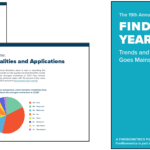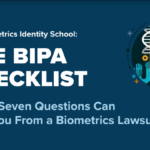Welcome to FindBiometrics’ digest of identity industry news. Here’s what you need to know about the world of digital identity and biometrics today:
Texas AG Files CUBI Suit Against Google
The Attorney General for the state of Texas, Ken Paxton, has filed a lawsuit against Google over its alleged violation of the Texas Capture and Use of Biometric Identifier Act, or “CUBI”. The lawsuit focuses on Google’s use of face biometrics to recognize individuals in its Google Photos app, its use of facial recognition in the Google Nest door camera, and its use of voice recognition in the Google Assistant, arguing that Google failed to obtain users’ explicit consent to have their biometrics collected through these systems. Unlike Illinois’s Biometric Information Privacy Act (BIPA), CUBI requires the state to file suit on consumers’ behalf; this is the second time Paxton has done so, after launching a complaint against Meta earlier this year.
Cosmetics Brands Face BIPA Lawsuit
A class action lawsuit has been filed against the cosmetics companies Estee Lauder, Bobbi Brown, Smashbox, and Too Faced under Illinois’s Biometric Information Privacy Act. The lawsuit concerns the companies’ use of ‘virtual try-on’ software, alleging that in so doing they collect users’ face biometrics data without properly disclosing the practice and without obtaining explicit consent from the end users, as BIPA requires.
White House Plans Launch of IoT Security Label
The White House is planning to reveal an “initial scope” of a cybersecurity label for Internet of Things devices in the spring of 2023, according to a senior administration official, who briefed reporters after a meeting with stakeholders on Wednesday. As Nextgov reports, the official also said that the National Institute of Standards and Technology will play a “major role” in the certification process for the planned label.
South Korean Presidential Office to Get Biometric Security
South Korea’s defense ministry is planning to deploy a biometric surveillance system to protect the presidential office. The system will apply facial recognition through a network of CCTV cameras. The effort is being undertaken after President Yoon Suk-yeol relocated the presidential office to a former defense ministry building earlier this year, though an opposition politician says that the defense ministry has been planning to enhance security since 2020.
TSA Renews NATACS Partnership
The Transportation Security Administration (TSA) has renewed its contract with National Air Transportation Association – Compliance Services (NATACS) for another five years. NATACS provides the TSA with services including the enrollment of flight crew members and the collection and storage of their biometric data, operating as a “Trusted Fingerprint Facility”. The organizations’ relationship spans two decades.
FaceTec’s Ascent Continues
FaceTec is reporting a 96 percent increase in revenues, year-over-year, for its third quarter, offering the latest illustration of its dramatic ascent. The 3D face biometrics specialist has also seen a 107.3 percent increase in the use of its 3D Liveness Check solution, and reports having signed several new clients in Q3 including Banco BV, Atlantic Data, and Tyme Global, among others. Read our full story.
AuthID.ai Upgrades Verified Platform
AuthID.ai has launched Verified 3.0, the newest iteration of its passwordless authentication platform. The system enables selfie-based authentication through any browser, and supports the OpenID Connect authentication protocol as well as the FIDO2 standard. AuthID calls its solution “unphishable”. Read our full story.
County Governments Embrace PortalGuard for MFA
Six county governments across Kansas, Virginia, New Mexico, Florida, South Dakota, and New York have recently established agreements with BIO-key to use its PortalGuard single sign-on platform. In announcing the contract wins, the company noted that county governments “are facing a cascade of ransomware attacks targeting the public sector,” prompting the need for multi-factor authentication solutions like PortalGuard.
WaFd Bank Deploys Voice Recognition System
WaFd Bank has seen a 90 percent reduction in the time needed for customers to make an account balance inquiry by implementing Talkdesk Identity, a voice-based authentication system. The system was introduced as part of a larger collaborative effort with Talkdesk that saw WaFd deploy its overarching Talkdesk Financial Services Experience Cloud for Banking.
Windows Hello Gets Biometric Consent Form
Microsoft has added a consent form to a preview version of its latest Windows 11 operating system. The form is for the use of face and fingerprint biometrics through Windows Hello, the operating system’s built-in biometric authentication system. It offers users the option of deleting their face and fingerprint data if they have not used the biometric authentication systems in over a year.
–
October 20, 2022 – by Alex Perala
Want to get the identity news digest early? Become a member and get the digest sent straight to your inbox, before it’s published on FindBiometrics:









Follow Us